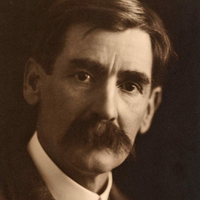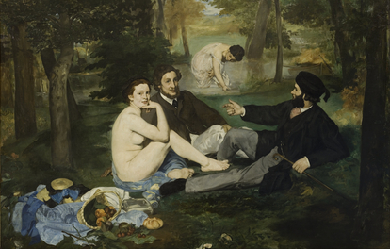A Song of Brave Men
Man, is the Sea your master? Sea, and is man your slave?—
This is the song of brave men who never know they are brave:
Ceaselessly watching to save you, stranger from foreign lands,
Soundly asleep in your state room, full sail for the Goodwin Sands!
Life is a dream, they tell us, but life seems very real,
When the lifeboat puts out from Ramsgate, and the buggers put out from Deal!
A gun from the lightship!—a rocket!—a cry of, “Turn out, me lad!”
“Ship on the Sands!” they’re shouting, and a rush of the oilskin-clad.
The lifeboat leaping and swooping, in the wake of the fighting tug,
And the luggers afloat in Hell’s water—Oh, “tourist”, with cushion and rug!—
Think of the freezing fury, without one minute’s relief,
When they stood all night in the blackness by the wreck of the Indian Chief!
Lashed to their seats, and crouching, to the spray that froze as it flew,
Twenty-six hours in midwinter! That was the lifeboat’s crew.
Twice she was swamped, and she righted, in the rush of the heavy seas,
And her tug was mostly buried; but these were common things, these.
And the luggers go out whenever there’s a hope to get them afloat,
And these things they do for nothing, and those fishermen say, “Oh! it’s nowt!”
(Enemy, Friend or Stranger! In every sea or land,
And across the lives of most men run stretches of Goodwin Sand;
And across the life of a nation, as across the track of a ship,
Lies the hidden rock, or the iceberg, within the horizon dip.
And wise men know them, and warn us, with lightship, or voice, or pen;
But we strike, and the fool survivors sail on to strike again.)
But this is a song of brave men, wherever is aught to save,
Christian or Jew or Wowser—and I knew one who was brave;
British or French or German, Dane or Latin or Dutch:
“Scandies” that ignorant British reckon with “Dagoes and such”—
(Where’er, on a wreck titanic, in a scene of wild despair,
The officers call for assistance, a Swede or a Norse is there.)
Tale of a wreck titanic, with the last boat over the side,
And a brave young husband fighting his clinging, hysterical bride;
He strikes her fair on the temple, while the decks are scarce afloat,
And he kisses her once on the forehead, and he drops her into the boat.
So he goes to his death to save her; and she lives to remember and lie—
Or be true to his love and courage. But that’s how brave men die.
(I hate the slander: “Be British”—and I don’t believe it, that’s flat:
No British sailor and captain would stoop to such cant as that.
What—in the rush of cowards—of the help from before the mast—
Of the two big Swedes and the Norse, who stood by the mate to the last?—
In every mining disaster, in a New-World mining town,
In one of the rescue parties an Olsen or Hans goes down.)
Men who fought for their village, away on their country’s edge:
The priest with his cross—and a musket, and the blacksmith with his sledge;
The butcher with cleaver and pistols, and the notary with his pike.
And the clerk with what he laid hands on; but all were ready to strike.
And—Tennyson notwithstanding—when the hour of danger was come,
The shopman has struck full often with his “cheating yard-wand” home!
This is a song of brave men, ever, the wide world o’er—
Starved and crippled and murdered by the land they are fighting for.
Left to freeze in the trenches, sent to drown by the Cape,
Throttled by army contractors, and strangled bv old red-tape.
Fighting for “Home” and “Country”, or “Glory”, or what you choose—
Sacrificed for the Syndicates, and a monarch “in” with the Jews.
Australia! your trial is coming! Down with the party strife:
Send your cackling, lying women back to the old Home Life.
Brush trom your Parliament benches the legal chaff and dust:
Make Federation perfect, as sooner or later you must.
Scatter your crowded cities, cut up your States—and so
Give your brave sons of the future the ghost of a White Man’s show.
1912


